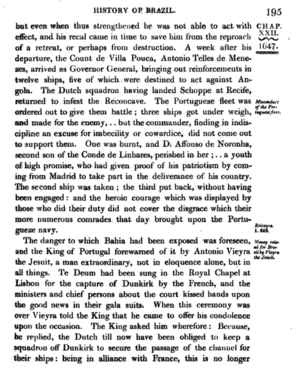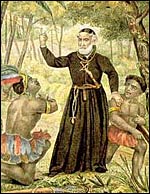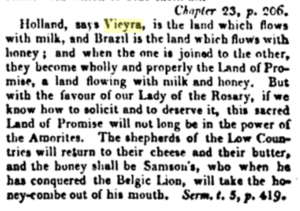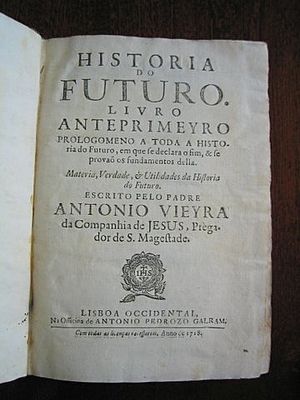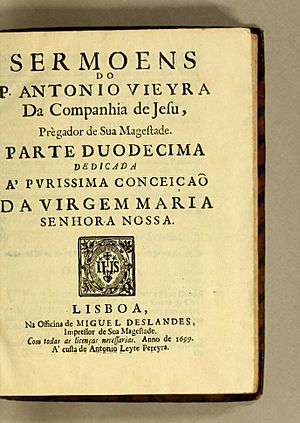António Vieira facts for kids
Quick facts for kids António Vieira |
|
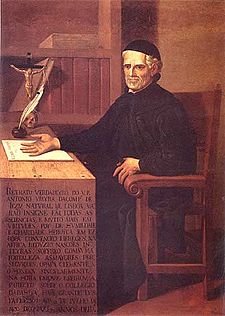 Vieira, c. early 18th century |
|
| Born | 6 February 1608 in Lisbon, Kingdom of Portugal |
|---|---|
| Died | 18 July 1697 (aged 89) in Bahia, Portuguese Colony of Brazil |
António Vieira (born February 6, 1608 – died July 18, 1697) was an important Portuguese priest, diplomat, and writer. He was a member of the Jesuit order. Vieira was known for his powerful speeches and his work as an advisor to the King of Portugal.
Vieira moved to Brazil in 1614 and later became a Jesuit priest. He was a great speaker and became a teacher to Prince Pedro. He also advised King John IV of Portugal. Vieira worked to make Portugal's economy better. He also spoke up for the rights of people who had recently converted to Christianity. He wanted to change how the Inquisition (a religious court) worked.
As a diplomat, Vieira traveled to many countries to help Portugal. He spent much of his life trying to help African slaves and native Indigenous people in Brazil. He fought to protect them from being treated unfairly. Vieira faced many challenges and was even put in prison by the Inquisition. But he eventually became free and respected again.
António Vieira is seen as one of the greatest writers in the Portuguese language. His letters, sermons, and other writings are very important. They help us understand the history of his time. Today, Vieira's work is still remembered with special coins, stamps, and school programs.
Contents
António Vieira's Life Story
António Vieira was born in Lisbon, Portugal. In 1614, when he was six years old, he moved with his parents to Brazil. His father worked there as a registrar. Vieira went to a Jesuit school in Bahia. He joined the Jesuit order in 1625. By the age of 18, he was already teaching. He also wrote important reports for his Jesuit province.
In 1635, he became a priest. He quickly became known for his amazing speeches. His early speeches in Bahia (1638–1640) showed his great imagination and powerful language. One of his sermons, about Portugal's fight against the Dutch, was called "perhaps the most extraordinary discourse ever heard from a Christian pulpit."
When Portugal got a new king, John IV, in 1640, Brazil supported him. Vieira was chosen to go to Lisbon to congratulate the new king. King John IV was very impressed by Vieira's skills. He made Vieira a teacher to his son, Prince Pedro. He also made Vieira his royal preacher and a member of the Royal Council.
Vieira worked hard to help Portugal. He helped with matters related to the army and navy. He also worked to improve trade. He suggested starting a national bank and a company to trade with Brazil.
Vieira used his sermons to suggest ways to make Portugal better, especially its economy. He also wrote many important papers. He suggested creating trading companies. He spoke out against unfair treatment of "New Christians" (people who had converted from Jewish or Muslim faiths). He also wanted to change the way the Inquisition worked. He believed Jewish and foreign traders should be allowed into Portugal safely. Vieira even criticized the way other preachers gave sermons. He said sermons should make people think about themselves, not just praise the preacher.
Diplomat and Missionary Work
In 1647, Vieira started working as a diplomat. He traveled to England, France, the Netherlands, and Italy. He tried to make peace with the Dutch by suggesting Portugal give them Pernambuco in Brazil. In 1650, he went to Rome to try to arrange a marriage between the Portuguese prince and the Spanish king's daughter. Vieira's success and his strong opinions made him many enemies. Only the king's help stopped him from being removed from the Jesuit order. So, he decided to return to Brazil.
When he was young, Vieira had promised to dedicate his life to helping African slaves and native Indigenous people in Brazil. He returned to Maranhão in 1653 and started his work again. He traveled deep into Brazil, teaching Christianity and European ways to many tribes. But after two years, he saw that the local rulers were exploiting the Indigenous people. He believed the Indigenous people needed to be protected by religious groups, not by the governors.
So, in 1654, he sailed back to Lisbon to ask the king for help. In 1655, he got new laws from the king. These laws put the missions under the control of the Jesuits, with Vieira in charge. They also stopped the enslavement of native people, except in special cases. Vieira returned to Brazil with these new laws. He organized missions over a huge area with 200,000 people. For the next six years (1655–1661), he worked tirelessly.
However, the colonists in Brazil became angry. They blamed the Jesuits for a shortage of slaves and lower profits. Other religious groups also became jealous of the Jesuits' control over the Indigenous people.
Vieira was accused of not being patriotic and of taking too much power. In 1661, after a revolt, he and 31 other Jesuit missionaries were sent back to Portugal. He found that his friend King John IV had died. The court was full of disagreements. But Vieira kept fighting for his cause. In 1662, he gave a famous speech in the royal chapel. He called for the king's laws to protect the Indigenous people to be followed.
Facing the Inquisition
Things were difficult for Vieira. The Count of Castelo Melhor, who feared Vieira's influence, sent him away. First to Porto, then to Coimbra. But Vieira continued to preach in both places. He also worked on reforming the Inquisition. To silence him, his enemies reported him to the Inquisition. He was called to appear before the religious court in Coimbra. They accused him of having ideas that went against church teachings in his sermons and writings.
Vieira believed in the prophecies of a shoemaker-poet named Bandarra. These prophecies spoke of a future ruler who would bring a time of great prosperity for the church and Portugal. This time was called the "Fifth Empire". Vieira tried to prove these prophecies using parts of the Bible in his book, Clavis Prophetarum. Because he refused to change his beliefs, the Inquisitors kept him in prison from October 1665 to December 1667. They finally ruled that he could not teach, write, or preach.
This was a big setback for the Jesuits. But Vieira regained his freedom and much of his respect when King Pedro II came to power. It was decided that Vieira should go to Rome to try and get his sentence changed. During his six years in Rome, Vieira achieved great success. Pope Clement X asked him to preach to important church leaders. He also became a close advisor to Queen Christina of Sweden.
At the Pope's request, Vieira wrote a long report about the Portuguese Inquisition. Because of his report, Pope Innocent XI stopped the Inquisition in Portugal for seven years (1674–1681). Finally, Vieira returned to Portugal with a special permission from the Pope. This permission meant he was free from the Grand Inquisitor's power. In January 1681, he sailed back to Brazil. He lived in Bahia and worked on preparing his sermons for publication. In 1687, he became the head of the Jesuit province there. False accusations and problems with others in his own order made his last months difficult. He died on July 18, 1697, in Salvador, Bahia.
Vieira's Lasting Impact
António Vieira is considered one of the most important literary figures in the Portuguese-speaking world. The Padre António Vieira Chair in Portuguese Studies was created in Brazil in 1994. It helps train teachers and researchers. This program helps improve cultural exchange between Brazil and Portugal. It also trains teachers in Portuguese Literature, Culture, and Language.
In 1997, Portugal released a special coin to mark 300 years since Vieira's death.
Portugal also issued a stamp in 2008 to celebrate 400 years since Vieira's birth (1608). Brazil has issued two Vieira stamps, in 1941 and 1997.
A statue of Father António Vieira was unveiled in Lisbon, Portugal, in 2017. It was created by the sculptor Marco Fidalgo.
Vieira's Writings
Vieira's writings are a huge part of Portuguese prose. He wrote over two hundred sermons. He was so skilled that he could discuss the same topic in different ways many times. His letters are simple and easy to read. They are also very important for understanding the history and politics of his time.
His main works include:
- Sermões (Sermons) (15 volumes, published from 1679–1748). Many newer editions exist. Some have been translated into Spanish, Italian, German, and French.
- História do Futuro (History of the Future) (published in 1718). This book, along with Quinto Império and Clavis Prophetarum, are similar works.
- Cartas (Letters) (3 volumes, published from 1735–1746).
- Notícias recônditas do modo de proceder a Inquisição de Portugal com os seus presos (News on how the Portuguese Inquisition proceeds with its prisoners) (published in 1821).
- Arte de Furtar (The Art of Stealing) was published under Vieira's name, but it is now known that he did not write it.
A large collection of Vieira's works, with notes and updates, began to be published in 2013. This project includes 30 volumes of his complete letters, sermons, and other writings. It is the first complete and carefully edited collection of all his many works. This huge project involved many researchers from Portugal and Brazil. They looked at over 20,000 pages of his manuscripts and printed works. They found about a quarter of the works had never been published before.
Famous Sayings
- "We are what we do. What we don't do, doesn't exist. Therefore, we only exist on days when we do. On the days when we don't do, we simply endure."
- "The goal of the men who invented books was to cherish the memory of past things, countering the tyranny of time and forgetful men."
- "Holland, is the land which flows with milk, and Brazil is the land which flows with honey; and when the one is joined to the other, they become wholly and properly the Land of Promise, a land flowing with milk and honey."
See also
 In Spanish: António Vieira para niños
In Spanish: António Vieira para niños
- Sermon of Saint Anthony to the Fish
 | James B. Knighten |
 | Azellia White |
 | Willa Brown |


